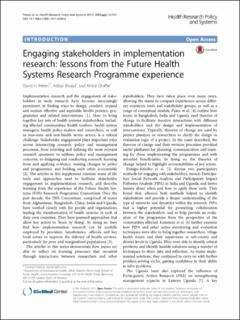| dc.contributor.author | Peters, D. H. | |
| dc.contributor.author | Bhuiya, A. | |
| dc.contributor.author | Ghaffar, A. | |
| dc.date.accessioned | 2023-03-20T09:06:05Z | |
| dc.date.available | 2023-03-20T09:06:05Z | |
| dc.date.issued | 2017 | |
| dc.identifier.citation | Peters, D. H., Bhuiya, A. & Ghaffar, A. (2017). Engaging stakeholders in implementation research: Lessons from the Future Health Systems Research Programme experience. Health Research Policy and Systems, 15(104). | en_US |
| dc.identifier.uri | https://hdl.handle.net/11250/3059146 | |
| dc.description.abstract | Implementation research and the engagement of stakeholders in such research have become increasingly prominent in finding ways to design, conduct, expand and sustain effective and equitable health policies, programmes and related interventions [1]. How to bring together key sets of health systems stakeholders, including affected communities, health workers, health system managers, health policy-makers and researchers, as well as non-state and non-health sector actors, is a critical challenge. Stakeholder engagement plays important roles across intersecting research, policy and management processes, from selecting and defining the most relevant research questions to address policy and management concerns, to designing and conducting research, learning from and applying evidence, making changes to policy and programmes, and holding each other accountable [2]. The articles in this supplement examine some of the tools and approaches used to facilitate stakeholder engagement in implementation research, and describe learning from the experience of the Future Health Systems (FHS) Research Programme Consortium. Over the past decade, the FHS Consortium, comprised of teams from Afghanistan, Bangladesh, China, India and Uganda, have worked closely with the people and organisations leading the transformation of health systems in each of their own countries. They have pursued approaches that allow key actors to ‘learn by doing’. In doing so, they find how implementation research can be usefully employed by providers, beneficiaries, officials and key local actors to improve the delivery of health services, particularly for poor and marginalised populations [3]. | en_US |
| dc.publisher | Health Research Policy and Systems | en_US |
| dc.rights | Navngivelse 4.0 Internasjonal | * |
| dc.rights.uri | http://creativecommons.org/licenses/by/4.0/deed.no | * |
| dc.subject | Future Health System (FHS) | en_US |
| dc.subject | village health teams | en_US |
| dc.subject | Uganda Team | en_US |
| dc.subject | address implementation issues | en_US |
| dc.subject | building management capacity | en_US |
| dc.title | Engaging stakeholders in implementation research: Lessons from the Future Health Systems Research Programme experience | en_US |
| dc.type | Journal article | en_US |
| dc.source.volume | 15 | en_US |
| dc.source.journal | Health Research Policy and Systems | en_US |
| dc.identifier.doi | https://doi.org/10.1186/s12961-017-0269-6 | |
| dc.source.articlenumber | 104 | en_US |

